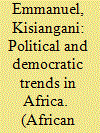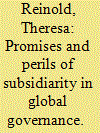| Srl | Item |
| 1 |
ID:
117649


|
|
|
|
|
| Publication |
2012.
|
| Summary/Abstract |
The introduction of multiparty politics in Africa and the resultant electoral democracy have had mixed outcomes in Africa. While there has been a general improvement in the continent's body politic and governance outlook, there have also been incidences where the democratic project has, by default or design, undermined or been undermined by Africa's structural fault lines that have led to relapses into instability and violence. This article reflects on the democratic project, particularly on the aspect of electoral democracy, by revisiting its trajectory and examining its challenges and prospects on the continent.
|
|
|
|
|
|
|
|
|
|
|
|
|
|
|
|
| 2 |
ID:
168490


|
|
|
|
|
| Summary/Abstract |
In the messy world of global governance, the principle of subsidiarity has the potential to order relations between different layers of governance as well as compensate for the legitimacy deficit of global governance institutions. However, subsidiarity has received surprisingly little scholarly attention in the discipline of International Relations. This article therefore seeks to examine the promises and perils of subsidiarity in global governance by adducing empirical evidence from Africa, a region which has authored norms and policies that often contest global norms and institutions. Based on two case studies of pro-democratic intervention in The Gambia and court proliferation at the (sub-)regional levels, the article concludes that while subsidiarity may strengthen democracy and the rule of law at the national level, it may also undermine the rule of law at the global level, as well as dilute fundamental global norms that serve to protect basic human rights. At the same time, subsidiarity provides opportunities for normative innovation, which suggests that more attention needs to be paid to the law-generating effects of subsidiarity and to the Global South as an agent of change in international law and global governance.
|
|
|
|
|
|
|
|
|
|
|
|
|
|
|
|